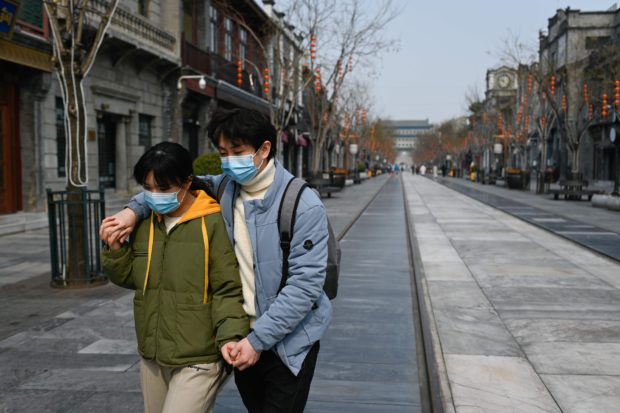Handshake? No thanks: outbreak changes global habits

LOVE AND CAUTION People around the world are doing away with some social gestures that require physical contact to avoid contracting the new coronavirus. But perhaps this young couple either don’t mind or can’t help it as they hold hands and wear medical masks while walking along a business street in Beijing on March 6. —AFP
PARIS—Say no to a handshake, refuse every peck on the cheek and definitely avoid hugging. Instead, try a direct gaze, or maybe a hand gesture.
Around the world people are changing their habits at work, home and in worship to reduce the risk of contracting the new coronavirus and prevent it from spreading any further.
Agence France-Presse (AFP) looks at changes in behavior due to the disease, which has killed more than 3,200 worldwide.
China
In Beijing, the capital of the country where the outbreak began, red hoardings tell people not to shake hands but to join their own hands together in a sign of greeting.
Loudspeakers tell people to make the traditional “gong shou” gesture (a fist in the opposite palm) to say hello.
Article continues after this advertisementFrance
Newspapers have been filled with advice on how to replace kissing on the cheek—an everyday greeting in France, even between people who have only just met—and handshaking, a common formality at work.
Article continues after this advertisementEtiquette expert Philippe Lichtfus, who has been widely cited in the media, says handshakes are a relatively recent development that began in the Middle Ages.
He says simply looking into a person’s eyes can suffice as a greeting.
Brazil
Brazil’s health ministry has recommended that citizens not share metal straws used to consume the caffeine-rich South American drink maté, also known as “chimarrao.”
Meanwhile, a kiss even if not on the mouth is totally advised against as a greeting.
Germany
In a sign of the times, Germany’s Interior Minister Horst Seehofer rebuffed Chancellor Angela Merkel’s attempt to shake hands with him on Monday, smiling and keeping both his hands to himself.
They both laughed and Merkel threw her hand up in the air before taking a seat.
Spain
The outbreak could hit one of Spain’s most cherished traditions—the kissing of sculptures of the Virgin Mary in the week leading up to Easter.
With just a month to go before the week starts, the ritual could be banned. “It is one of the measures that is on the table,” said national health official Fernando Simon.
During the holy week, the faithful queue up to kiss the hands or feet of sculptures of Mary and the saints, seeking their protection.
Romania
Romania’s Martisor festival marks the beginning of spring when talismanic strings and flowers are handed out, often from men to women.
But the government has passed on a message to people urging them to hand over the flowers and talismans without the accompanying kiss.
“Let’s give the flowers but not the kiss,” said Nelu Tataru, state secretary at the health ministry.
Poland
In one of Europe’s most Catholic countries, the faithful are allowed to take “spiritual communion” instead of consuming the communal bread or it can be taken in the hands rather than the mouth.
The faithful have also been asked not to dip their hands in holy water when going in and out of the church and instead make the sign of the cross.
Iran
Is the footshake the new handshake?
In Iran, a video has gone viral showing three friends meeting hands in their pockets, with two of them wearing masks tapping their feet against each other as a greeting.
A similar video in Lebanon shows singer Ragheb Alama and comedian Michel Abou Sleiman tapping their feet against each other while making kissing noises with their mouths.
New Zealand
Some educational institutions in New Zealand have temporarily abandoned the Maori greeting known as the “hongi,” which involves two people pressing their noses together.
Wellington polytechnic WelTec said that instead of staff greeting new students with a hongi, its welcome ceremony would instead include a “waiata,” or Maori song.
Australia
New South Wales Health Minister Brad Hazzard urged Australians to kiss with caution and suggested a pat on the back instead of a handshake.
“It’s a very Australian thing to put your hand out to shake hands, for example. I would be suggesting to the community … it’s time that Aussies actually gave each other a pat on the back for the time being, no handshaking,” he said.
“There are other things that can be done I’m not going to say don’t kiss, but certainly you could be exercising a degree of care and caution with who you choose to kiss.”
UAE
The United Arab Emirates, as well as Qatar, are advising citizens to stop the traditional “nose to nose” greeting.
The UAE also said that people shouldn’t shake hands or kiss. Greet each other “by waving only,” it said.
United StatesAccording to ESPN, star players of the National Basketball Association have been given a series of recommendations on interacting with fans, including bump fists rather than high-fives, and avoiding items for autograph, such as pens, balls and jerseys.
Some players have already taken steps to limit their exposure to the virus. Portland Trail Blazers star C.J. McCollum said he was no longer signing autographs because of the outbreak.
“Make sure y’all washing y’all hands with soap for 20 or more seconds & covering ya mouths when you cough,” McCollum wrote on Twitter.
For more news about the novel coronavirus click here.
What you need to know about Coronavirus.
For more information on COVID-19, call the DOH Hotline: (02) 86517800 local 1149/1150.
The Inquirer Foundation supports our healthcare frontliners and is still accepting cash donations to be deposited at Banco de Oro (BDO) current account #007960018860 or donate through PayMaya using this link.